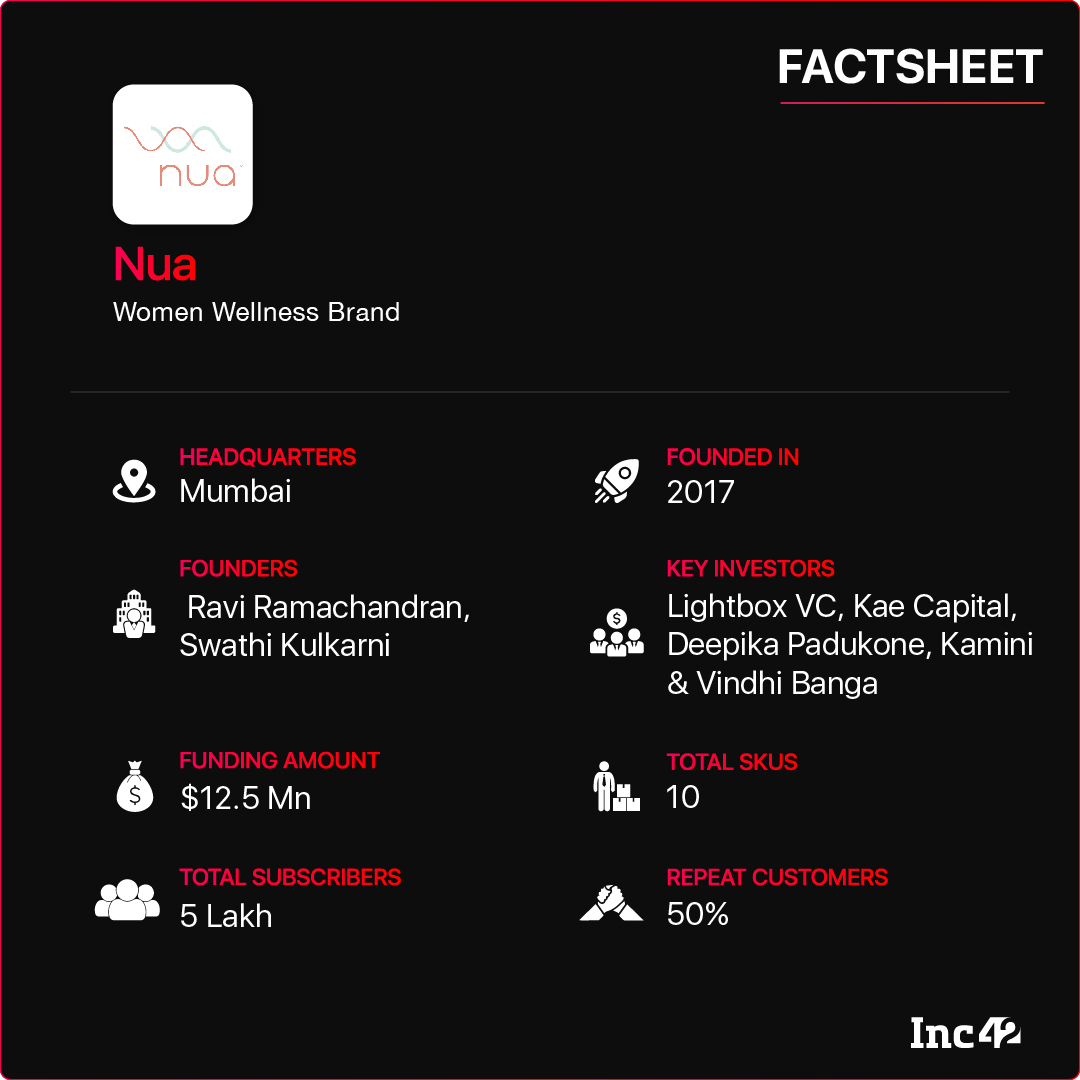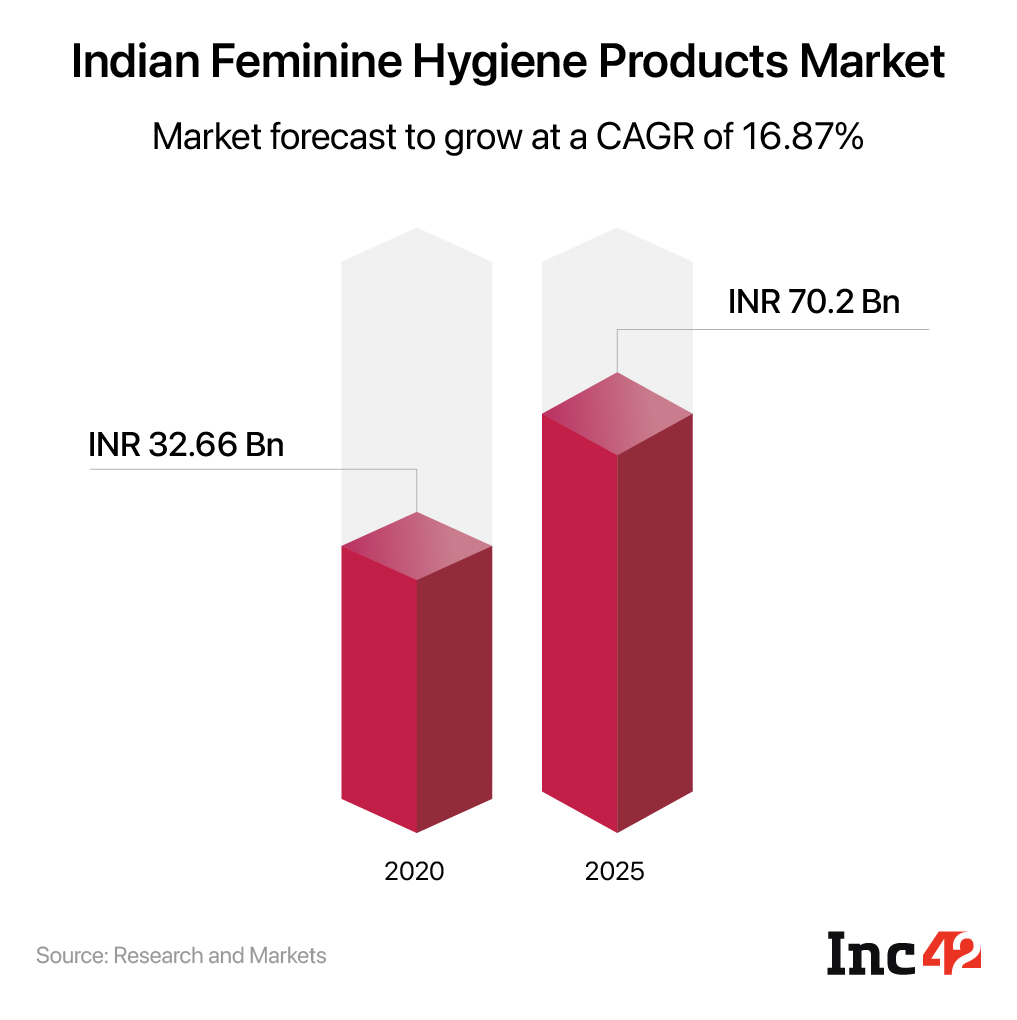Mumbai-based women wellness brand Nua has developed a portfolio of products for period care, intimate hygiene and more
The startup also has a subscription model and claims to have over five lakh subscribers
It has raised $12.5 Mn in four funding rounds and counts names such as Lightbox VC, Kae Capital and actor Deepika Padukone as its investors
There are many fallacies built around female healthcare, particularly in India and other south Asian countries. Poor hygiene and wellness is the immediate outcome of stigma and shame attached to a natural biological process like menstruation. This is where femtech — technology-enabled, female hygiene and health-centric products and solutions — are aiming to make a difference.
There are a handful of brands vying for a bigger share of the femtech market. Nua, Mind & Mom, Niramai, Ovaika, Carmesi, CareMother, CervAstra, Celes Care, Elda Health are a few to name. From these names, Mumbai-based Nua is aiming to create a difference with its holistic and personalised wellness solutions. Set up in 2017, the startup has a varied portfolio of products that includes sanitary pads, products for period care, intimate hygiene and more.
Speaking to Inc42, Nua’s cofounder and CEO, Ravi Ramachandran said, “We understand that every woman’s period journey is different. Which is why we have designed a sanitary pad solution that is not just ‘thought around women’ but also gives them the flexibility to choose a product that works for their individual needs.”
To offer this personalised experience, Nua has a subscription plan wherein customers can choose a personalised pack of 12 pads from three different sizes. Not only is the subscription model challenging the ‘one-size, fit-all status quo’, but has also helped it build a 5 Lakh strong subscriber base, the startup claimed.
By bypassing the universal wellness approach and focussing on individual experience, the startup claims to have achieved a 50% repeat purchase rate in the last 12 months.
But the road to success was challenging, acknowledged Ramachandran.
“Fundraising at a time when both femtech and D2C were not as ‘cool’ was a big challenge. Further, the Covid-19 pandemic posed a fresh batch of challenges,” he said.

How The D2C Factor Helped Nua
In recent years, D2C has emerged as a preferred retail model for both large enterprises and new-age brands. But it was only during the peak period of Covid-19 that it received a shot in the arm. According to an Inc42 report, D2C brands recorded consumer demand growth of 88% in 2021 compared to the previous year.
This, coupled with the pandemic-induced adoption of online shopping worked well in Nua’s favour. In 2017, (when Nua’s journey began) there were an estimated 75 Mn Indians shopping online. In FY’20, the number jumped to over 100 Mn, registering a 33% increase.
But the competition out there is fierce. Brand recognition, product awareness, brand loyalty and recall value are vital for success in D2C retail. As brands struggle for recall value in highly cluttered platforms like YouTube and Instagram, Nua has augmented its D2C endeavours with influencer marketing, customisation and subscription sales.
“Influencer marketing is an important lever for us to not only build brand awareness and consideration, but also to bring about a positive change in the perception and conversations on menstruation,” Ramachandran said.
However, there is more to the picture. A customer’s purchase journey does not merely stop at making a purchase. A seamless and contextual post-purchase experience is critical to ensure a high CLTV (customer lifetime value) and retention rate.
The wellness brand delivers this through focused initiatives in operational experience, customer support and leveraging technology to maximise post-purchase subscriber experience.
“We continuously monitor and improve this process through everyday conversations with our customers,” Ramachandran said.
Nua’s Manufacturing Prowess
Nua claims its products are toxin-free and the ingredients are 100% safe. “Nua products are toxin free, cruelty free, vegan and have been certified by global organisations,” said Ramachandran.
Nua Sanitary Pads are certified by Safe Cosmetics, Australia, an independent, non-government, natural and organic, cosmetics standards organisation.
“Nua Sanitary Pads are also dermatologically tested to provide a rash-free and comfortable experience,” Ramachandran said.
Nua products, designed by global experts, are produced in the state-of-the-art manufacturing facilities within the country. All products undergo rigorous quality tests.
“Our manufacturing partners are ISO-certified and follow GMP (good manufacturing practice). GMP system ensures that products are produced and controlled according to quality standards. According to the World Health Organization (WHO), GMP not only prevents errors that cannot be eliminated through quality control of the finished product but also prevents contamination of products. We not only have inline quality testing during manufacturing but also have put in place robust operating processes for effective quality control of inbound RM (raw material) and PM (packaging material),” Ramachandran added.
Normalising Periods, Conversations Around It
The female hygiene industry, which is at its nascent stage, is faced with many challenges. Reluctance to accept products and solutions by the masses is perhaps the biggest of them. According to a Research & Markets’ report, in 2020, less than 41% of 355 Mn menstrual women employed hygienic menstruation protection techniques.
Nua has always wanted to normalise menstruation and the conversation around it. It offers a space to talk about menstruation and wellness without any inhibitions. It opted for story-telling content delivered by macro-influencers, handpicked for different regions, to bring about a societal change in conversations around periods. Some of its influencer campaigns delivered in excess of 70 Mn views, spreading brand awareness across places.
The brand experimented with thematic campaigns. On Valentine’s Day this year, Nua highlighted that periods are not just a ‘you’ (woman), but it can be an ‘our’ (partner + woman) affair such that it makes it a little more bearable, physically and emotionally, for both the woman and her partner.
“The campaign #PeriodPartners brought this to life using mega and macro couple influencers, each narrating this story in their own unique style, amassing millions of views and high-quality engagement.”

Femtech Can Bring In Positive Social Changes
Femtech companies are changing the women’s healthcare space for the better. Products and services have been tailor-made with the help of advanced tech to meet specific requirements. From addressing stigmatised areas to cancer screening, new categories are coming up regularly.
And global trends are testimony to the potential of femtech. According to Medi-Tech, the global femtech market was valued at $22 Bn in 2020 and is set to witness a healthy growth rate of 15% in the next five years.
Femtch’s growth trajectory and its promising potential to pivot from a nascent industry is being noticed by legacy players. Case in point, global personal care brand L’Oréal had recently announced a partnership with the period-tracking app Clue to deepen knowledge on the relationship between skin health and the menstrual cycle.
In India too, things are looking up for the fintech industry. Investors, who were once sceptical, are now increasingly funding femtech startups. Over four funding rounds, Nua raised a total of $12.5 Mn.
In its last Pre-Series B funding round in 2021, the brand raised $7.1 Mn by existing investor, Lightbox Ventures as well as new investors; Vindi Banga and Kamini Banga. The round also saw participation from actor Deepika Padukone who is also Nua’s brand ambassador.
Over the next 18 months plans to build on this strong foundation and expand into adjacent categories, look at expanding distribution footprint and continue to invest in technology and innovation.
As femtech companies are increasingly gaining traction and changing the competitive landscape, stakeholders within and beyond the healthcare ecosystem could well provide additional momentum.



![Read more about the article [Funding alert] Rural retail aggregator SuperK raises Rs 6 Cr in seed round led by STRIVE VC](https://blog.digitalsevaa.com/wp-content/uploads/2021/04/Imaget5kk-1618462844876-300x150.jpg)






